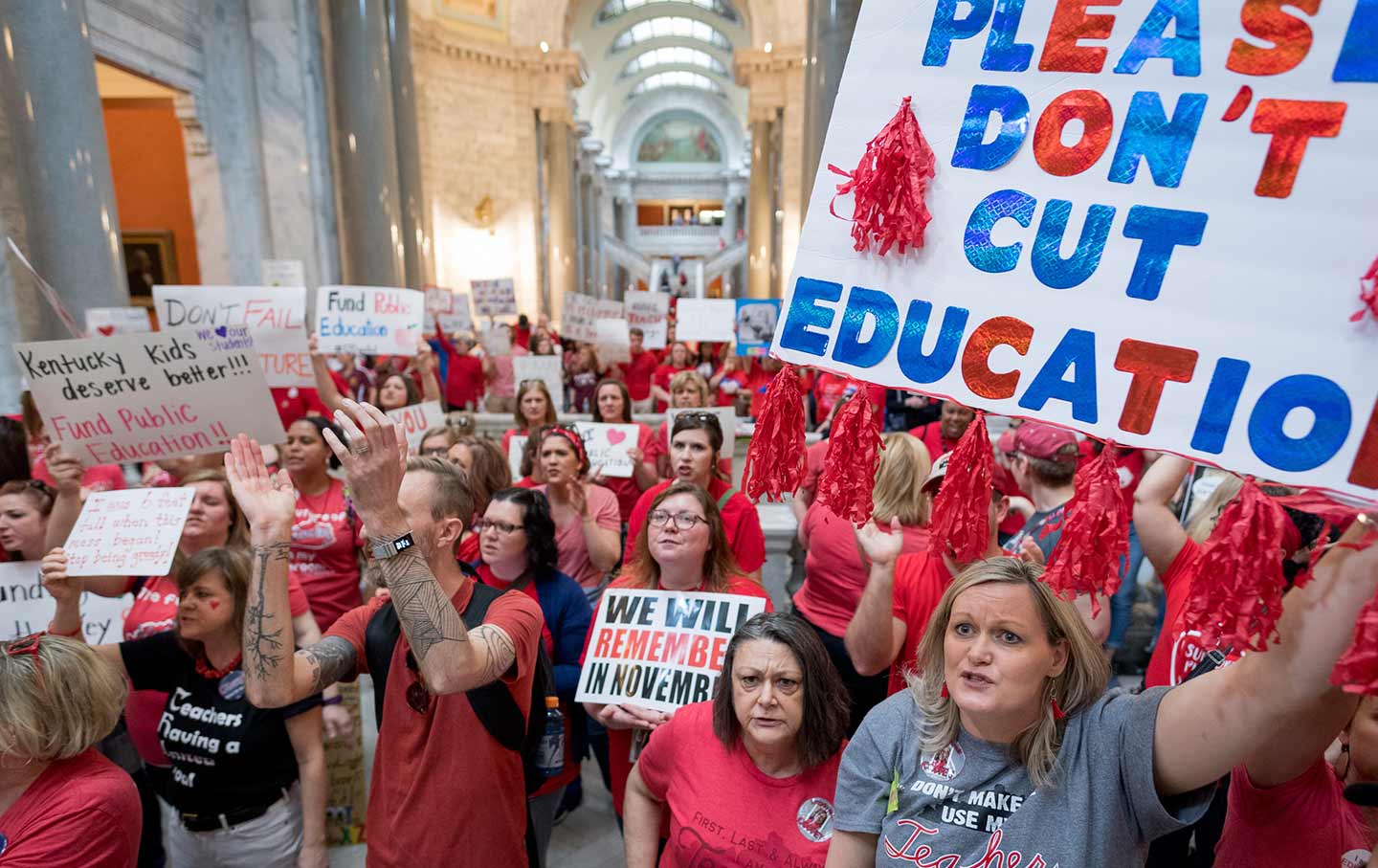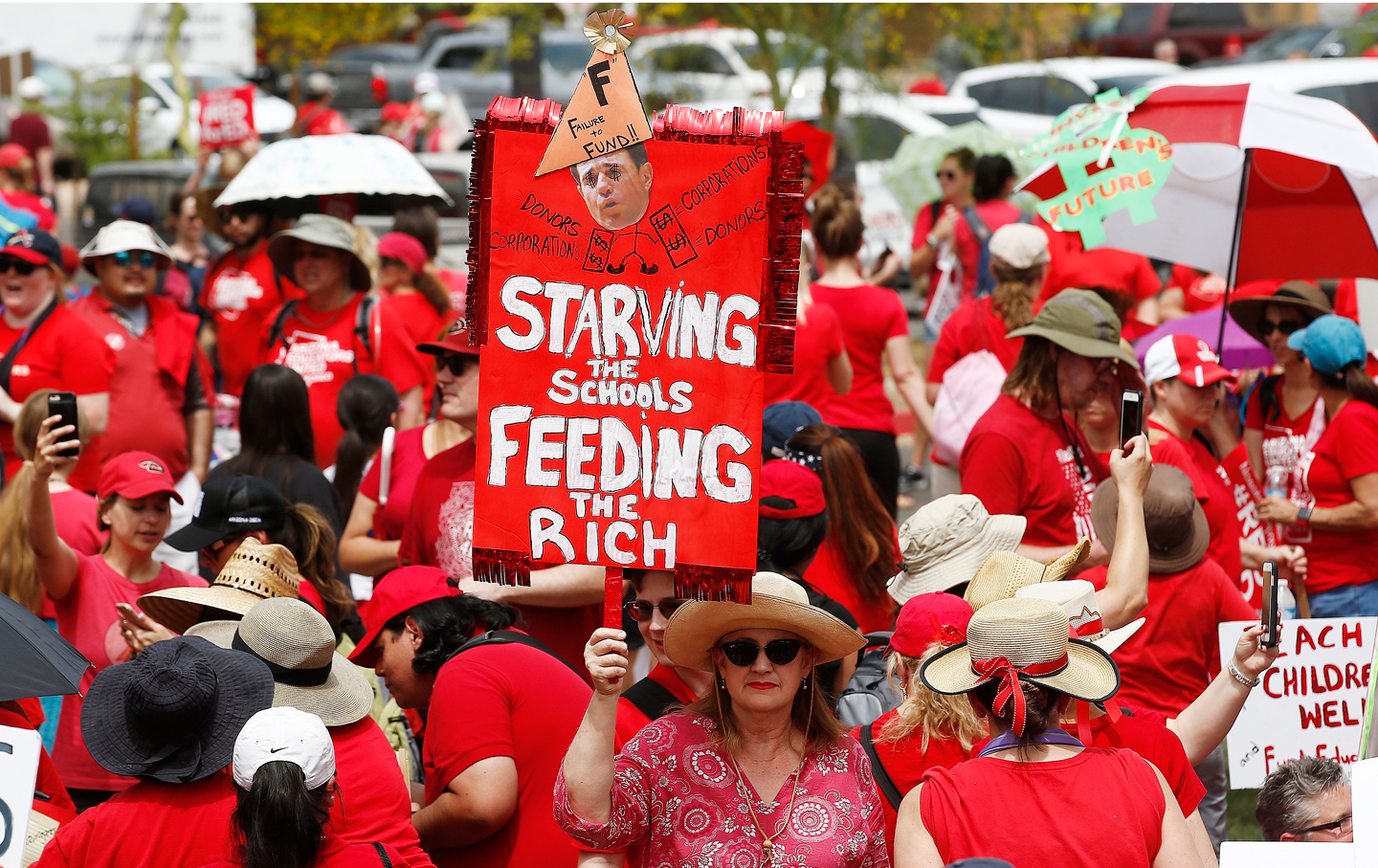Going into 2018, the writing on the wall spelled doom for organized labor. Trump had seemingly tricked large sectors of the country into believing that he was a populist aimed at reconfiguring the global economy to serve US workers—then, once in power, he staffed federal agencies with anti-union ideologues, while cutting sweetheart deals for corporations and the wealthy. The federal government at large was poised to attack organized labor on every front, through legislation and in the courts, and state governments were expected to continue submitting to a decades-long campaign by the 1 percent to undo a century of union progress. Yet, despite this dire outlook, there came moments of truly astonishing solidarity that resulted in previously unimaginable victories.
These are the three worst stories for workers from the year thus far, the stories to make you hang your head—and three more to pick up your chin.
The Bad
Two-Faced Betrayal: Janus v. AFSCME
Without question, the biggest loss borne by organized labor in 2018 was the Supreme Court’s decision in Janus v. AFSCME in June. Coming down 5-4 in favor of Mark Janus in his suit against his union, the American Federation of State, County, and Municipal Employees, the Supreme Court ruled that public-sector unions’ levying fees on non-union members is a violation of the First Amendment. The case is expected to have ramifications throughout the country, as already embattled unions are forced to represent non-members who contribute nothing in dues or fees. As Moshe Z. Marvit described, rather than being an issue of free speech, Janus v. AFSCME is the culmination of an anti-labor campaign by wealthy business owners and their lackey politicians that was 65 years in the making.
No Class: Epic Systems Corp. v. Lewis
While Janus stole the limelight, it was actually the second drubbing the Supreme Court gave labor in 2018. One month before Janus, the Court ruled, in another 5-4 decision, that employment contracts mandating individual arbitration supersede the rights of workers to take collective legal action, such as class-action lawsuits. The case, dubbed Epic Systems Corp. v. Lewis, was actually the consolidation of three different suits: two in which employers sought to quash legal challenges against them by employees seeking overtime compensation, and one by the National Labor Relations Board asserting workers’ right to collective legal action. The defeat of the employees and the NLRB means that US workers who toil under contracts mandating arbitration—more than 85 million of them, as reported by Michelle Chen—have lost legal rights that they held just four months ago.
Federal Union Busters: Trump’s NLRB Appointees
As a federal agency, the National Labor Relations Board is governed by five board members appointed by the president and approved by the Senate. Trump has assigned three of the current board members, as well as the agency’s general counsel, and the results have been predictably hostile to labor. Michelle Chen highlighted one especially troubling development: In 2015, the NLRB’s previous general counsel argued that McDonald’s was a joint employer of all franchisee employees, possibly paving the way for chain-wide unionization; that case was sabotaged earlier this year by the NLRB’s new general counsel, Peter Robb, who requested a 60-day stay on the trial to obtain a settlement. Whereas a trial victory could have established a precedent applicable to all franchises, a settlement will allow McDonald’s to simply cut a deal. The case is still pending, but the outlook is grim—especially as two Trump-appointed NLRB board members, Chairman John Ring and William Emanuel, previously worked for union-busting law firms.
Popular
"swipe left below to view more authors"Swipe →
The Good
No More Cages: Nationwide Prison Strike
While traditional unions attempting to work through official channels were stymied time and time again in 2018, more grassroots forms of labor organizing flourished. In one ongoing example described by Raven Rakia, prisoners in at least 17 states have come together to launch a nationwide prison strike. Supported by more than 150 outside organizations, prisoners are refusing to work, boycotting commissaries, and staging hunger strikes, sit-ins, and other forms of protest until their demands to end forced prison labor, improve conditions, reinstate parole, and more are met. This strike follows another one in 2016 that was estimated to be the largest in US history, as well as a South Carolina prison riot in April, which left seven prisoners dead. The current strike is planned to continue until September 9, the anniversary of the 1971 Attica prison uprising.
The Price is Wrong: Missouri’s Prop A
In 2017, former Missouri Governor Eric Greitens signed legislation barring unions from collecting agency fees from non-union members, making the Show Me State the 28h in the nation with so-called “right to work” laws. But as John Nichols reported, Missourians did not take this attack on their unions lying down. Just hours after Greitens had scrawled his signature, union members, labor organizers, and their supporters announced that they would challenge the bill through an uncommon tactic: the referendum. They collected 300,000 signatures to have the legislation included as a ballot measure—Proposition A—in a statewide election last month, then voted overwhelmingly to shoot it down. Greitens was not in office long enough to suffer this defeat, having resigned in June following charges of campaign finance violations and blackmail relating to an extramarital affair.
Pencils Down: A Wave of Teachers’ Strikes
If Janus v. AFSCME was the nadir for labor in 2018, then the wave of teachers’ strikes was undoubtedly the zenith. Amid fears that legislation further crippling unions would be a death sentence for organized labor in the United States, teachers in West Virginia—a state already mired in years of “right to work”—struck out against their elected representatives and even their union leaders to launch the first of what became a wave of strikes by educators in eight states. As Jane McAlevey and Steve Fraser pointed out, these teachers fought not only for livable wages but also against austerity and acquiescent union bureaucracy. In their victories, as well as their ongoing struggles, these educators demonstrated that labor’s power is created by workers coming together to fight for one another—and no law, court, or politician can usurp that.
The year thus far has demonstrated that, regardless of how the scales are stacked against organized labor by business and government, how many anti-union appointments Trump makes or how many lawsuits, campaigns, and bills the wealthy bankroll, workers can nonetheless emerge victorious. The path forward is clear: Increasing repression can only be cut through by greater solidarity. In that sense, 2018 was just another rehearsal of a very old lesson—“The workers united will never be defeated.”




